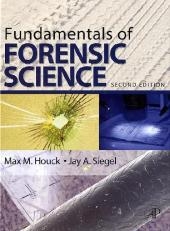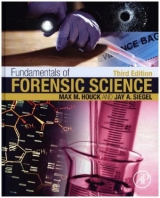
Fundamentals of Forensic Science
Academic Press Inc (Verlag)
978-0-12-374989-5 (ISBN)
- Titel erscheint in neuer Auflage
- Artikel merken
Fundamentals of Forensic Science, Second Edition, provides an introduction to the basic principles of forensic science. The book begins at a crime scene and ends in the courtroom.The book is divided into six parts. Part 1 provides an overview of criminal justice and forensic science, covering the basics of crime scene investigation and the nature of evidence. Part 2 discusses analytical tools, including microscopy, Raman spectroscopy, mass spectrometry, atomic spectroscopy, and separation methods. Parts 3 to 5 discuss the various types of forensic evidence collected, categorized by the types of science employed in their analysis: physical science, chemical science, and biological science. These include pathology; anthropology and odontology; entomology; serology and bloodstain pattern analysis; DNA analysis; forensic hair examinations; forensic toxicology; fiber and paint analysis; friction ridge examination; and firearms and tool marks. Part 6 discusses the legal aspects of forensic science. The book is written for students with a background in basic science, and it is can be used in a one-semester or two-semester format.
Dr. Max M. Houck is an internationally-recognized forensic expert with research interests in forensic science, education, and the forensic enterprise and its industries. He has worked in all aspects of forensic science, including at the FBI Laboratory. Dr. Houck has published widely in books and peer-reviewed journals. His anthropology and trace evidence casework includes the Branch Davidian Investigation, the September 11 attacks on the Pentagon, the D.B. Cooper case, the US Embassy bombings in Africa, and the West Memphis Three case, among hundreds of others. He served for six years as the Chair of the Forensic Science Educational Program Accreditation Commission (FEPAC). Dr. Houck is a Fellow of the Royal Society of Chemistry and a founding Co-Editor of the journal Forensic Science Policy and Management. Jay Siegel, PhD is retired Director of the Forensic and Investigative Sciences Program and Chair of the Department of Chemistry and Chemical Biology at Indiana University Purdue University Indianapolis. He was Director of the Forensic Science Program at Michigan State University for 25 years from 1980-2004 until his retirement as Professor Emeritus. Dr. Siegel is a Distinguished Member of the American Academy of Forensic Sciences and was named as Distinguished Alumni Scholar by his alma mater, George Washington University in 2011. He is co-editor of Forensic Science Policy and Management: An International Journal. He was a member of the National Academy of Sciences Forensic Science Committee from 2006-09.
1. Introduction 2. Crime Scene Investigation 3. The Nature of Evidence 4. Microscopy 5. Light and Matter 6. Separation Methods 7. Pathology 8. Anthropology and Odontology 9. Entomology 10. Serology and Bloodstain Pattern Analysis 11. DNA Analysis 12. Forensic Hair Examinations 13. Illicit Drugs 14. Forensic Toxicology 15. Textile Fibers 16. Paint Analysis 17. Soil and Glass 18. Fires and Explosions 19. Friction Ridge Examination 20. Questioned Documents 21. Firearms and Tool Marks 22. Impression Evidence 23. Legal Aspects of Forensic Science
| Erscheint lt. Verlag | 26.1.2010 |
|---|---|
| Verlagsort | San Diego |
| Sprache | englisch |
| Maße | 189 x 246 mm |
| Themenwelt | Recht / Steuern ► Strafrecht ► Kriminologie |
| ISBN-10 | 0-12-374989-1 / 0123749891 |
| ISBN-13 | 978-0-12-374989-5 / 9780123749895 |
| Zustand | Neuware |
| Haben Sie eine Frage zum Produkt? |
aus dem Bereich



